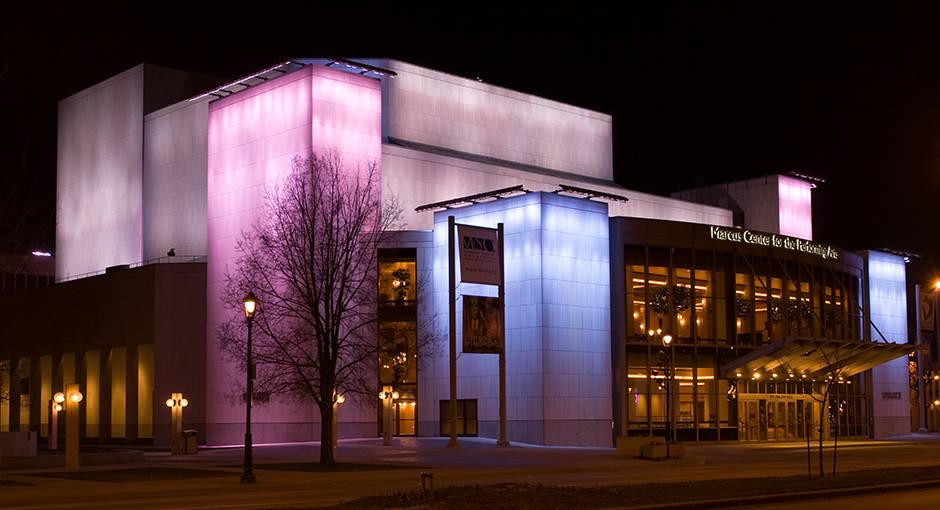Is Abele Dumping the Marcus Center?
Its takeover by new “Super District” running Bucks arena looks fishy.
One day Milwaukee County Executive Chris Abele got up and decided he’d like to change the governance of the Marcus Center for the Performing Arts. Lo and behold, Republican legislators agreed with him, or more likely didn’t care one way or the other about it, and so an idea never broached in public was suddenly enacted into a bill mainly concerned with creating a new NBA arena.
Welcome to the new world of government by whim. Gov. Scott Walker and Republican legislators make revolutionary changes like ending tenure and shared governance in the UW System or slashing the number of scientists in the state Department of Natural Resources after no study or legislative hearings, so perhaps Abele saw an opportunity to get one of his whims enacted into law in the same fashion.
Abele, I should add, did offer me an interesting rationale for the change, which we’ll get to, but it might first be helpful to review the history of the Marcus Center to understand how far afield its history is from that of pro basketball.
As it was originally called, the Performing Arts Center, or PAC, was completed in 1969 and was a key event in the maturation of the city’s performing arts scene. The idea was a to create a spectacular venue with three performance halls for local groups like the Milwaukee Symphony Orchestra, Milwaukee Ballet, Florentine Opera and Milwaukee Repertory Theater.
It was a huge success, greatly elevating the profile, audiences and revenue of all these groups, so much so that the Rep grew to create its own theater complex in the 1980s, and the space it once used, the PAC’s Todd Wehr Theater, was taken over by the First Stage children’s theater. From its very beginning the PAC was a public-private venture in which the public portion came from Milwaukee County, which also provided funding for the Milwaukee Art Museum. County executives would often talk passionately about their financial commitment to “quality of life” institutions like arts groups, the Public Museum and zoo.
In 1994, as a result of a $5 million donation from the Marcus Corporation, the PAC changed it name to the Marcus Center for the Performing Arts. But the facility’s relationship with the county has continued for 46 years. The county currently contributes $1.09 million or about 20 percent of the Marcus Center’s $5.16 million budget.
Yet the legislation creating the new Bucks arena calls for the Marcus Center to suddenly come under the governance of the Wisconsin Center District or WCD, whose central mission is running the downtown convention center. The WCD also runs the UWM Panther Arena and the Milwaukee Theatre. But the legislation calls for the creation of a “super district,” a WCD board that will also oversee the new Bucks arena and, for some reason, the Marcus Center. Why?
It’s a cinch that Republican legislators didn’t propose this. I contacted the office of Senate Majority Leader Scott Fitzgerald for his rationale and his aide Myranda Tanck responded tersely: “I believe that the County Executive’s office will be the best contact for any questions regarding the Wisconsin Center District governance.” (Assembly Speaker Robin Vos hasn’t responded to my question.) Abele doesn’t deny the Marcus Center switch was his idea and points to the competition that went on between some downtown venues, suggesting this consolidation will force them to work together.
But as it turned out, the consultants who believed a 4,000-seat theater would fill a gap in Milwaukee and be a big success were dead wrong. The Milwaukee Theatre is now pointed to as a major failure and has been seized on to suggest the WCD needed new leadership. As Abele wryly notes, “it certainly seems to be a sub-optimal idea in retrospect.”
But the problem with the Milwaukee Theatre is that it was “a departure from the WCD’s mission, which is centered around the convention center and bringing tourists to Milwaukee,” notes the leader of a major downtown facility. “So how do you make that better by adding another theater, the Marcus Center, to the Wisconsin Center?”
Abele counters that the Marcus Center, Milwaukee Theatre, UWM Panther Arena and new Bucks arena will all be close to each other and competing for entertainment, so why not have them work cooperatively and “co-promoting each other” and perhaps save on administrative costs? “If you were starting these organizations from scratch,” Abele asks, “wouldn’t you want them all under one central administration?”
Actually, no. Because the mission of the Wisconsin Center District is most focused on the convention center and its secondary focus will become the new Bucks arena. Its third focus will be the UWM Panther Arena, which is also likely to become the home of the Milwaukee Admirals. The next focus will be on trying to get more bookings at the under-utilized Milwaukee Theatre. The Marcus Center, and the local arts groups it mostly serves will be far down the list of priorities.
Abele points to the tremendous success of the Pabst Theater, Riverside Theater and Turner Hall, which are all booked by Gary Witt’s highly successful Pabst operation, as an example of saving on administrative costs. But Witt’s success is also about having a fierce sense of mission (rock and popular music and comedy is most of what‘s offered) and acute sense of what its audiences want. How would you transfer that laser-beam focus to the sprawling monstrosity the WCD will become?
And is it really likely the Marcus Center will save on administrative costs by becoming part of a many-headed, downtown Super District? As Abele notes, the Marcus Center has “historically done a pretty good job” of managing its costs.
As Abele concedes, the suspicion among many is that his goal is to eliminate the $1 million subsidy the county provides to the Marcus Center, not to mention the estimated $37 million in deferred maintenance costs the center faces, according to a 2013 Public Policy Forum study. But the county exec emphatically denies this and promises he will create an “MOU” (Memorandum of Understanding) with the Marcus Center, as the county has with the Public Museum, that will spell out the county’s long-term financial commitment to the Marcus Center.
I’m heartened to hear that, but what guarantee is there that Abele’s successor as county exec won’t seek to rewrite the MOU and reduce the county’s commitment, with the obvious rationale that it is run by a separate governmental entity with its own taxing power? The WCD levies the hotel room, car rental and food and beverage taxes, but all the money is promised for decades to come to pay off the cost of the Milwaukee Theater and the lion’s share of public costs for the new Bucks arena and after that its priority would be to expand the convention center. I can’t envision a time when the WCD will ever be interested in supporting the Marcus Center.
And when it comes to trying to raise private dollars to, say, create an endowment for the Marcus Center, that becomes doubly hard when it has financial connections to two different and huge governmental entities, the WCD and the county.
Abele notes that there actually is no MOU between the county and the Marcus Center, suggesting he is actually creating a more sensible legal structure than what now exists. In truth, the Marcus Center’s governance has been peculiar. It is not only subject to Milwaukee County financially, but has its own board of directors, and until 2013 was also overseen by the board of directors of the War Memorial, an arcane arrangement that went back as far as the early 1960s, when the original goal was to create a new performing arts center not on Water Street but near the Milwaukee Art Museum.
So yes, the Marcus Center’s governance could use some firming up. An MOU wouldn’t be a bad idea. But the rock-bed reality is that the county has had a 46-year commitment to the Marcus Center that has rarely been questioned. Once its governance is switched to a different taxing entity, those questions will inevitably arise.
In short, it’s difficult to see any advantage for the Marcus Center in this new governance structure. Its longterm future suddenly looks a good deal less certain.
Correction: An early version of this story wrongly suggested the Marcus Center was still overseen by the War Memorial’s board, an arrangement that ended in 2013.
Update July 29: Abele’s spokesperson Nate Holton contacted me to contest my take, and offered these thoughts: (1)The MOU “establishes a commitment and promise of long-term funding” that will make it harder for successors to Abele to unilaterally change; and (2)Abele will have five appointments to the WCD board and will therefore “have an obvious say over the board’s focus as a result.”
More about the New Bucks Arena
- Back in the News: Bucks Owners Continue to Cash In - Bruce Murphy - Nov 28th, 2022
- Murphy’s Law: Bucks Subsidy An Issue in US Senate Race - Bruce Murphy - May 9th, 2022
- Murphy’s Law: Bucks Franchise Worth $1.86 Billion - Bruce Murphy - Jan 25th, 2021
- Op Ed: County Parks Lost Funding to Bucks Arena - Patricia Jursik - Jul 7th, 2020
- Eyes on Milwaukee: Fiserv Forum Workers to Get $15/Hour - Jeramey Jannene - Jan 29th, 2020
- Eyes on Milwaukee: Bucks Beat Hiring Targets on Fiserv Forum - Jeramey Jannene - Nov 20th, 2019
- Murphy’s Law: Taxpayers Make Bucks, Brewers Rich - Bruce Murphy - Apr 16th, 2019
- Eyes on Milwaukee: Bucks Unveil Master Plan for Park East - Jeramey Jannene - Mar 15th, 2019
- Eyes on Milwaukee: Bucks Plan Massive Arena Signs - Jeramey Jannene - Feb 12th, 2019
- Eyes on Milwaukee: Bucks’ New Bar Is “The MECCA” - Jeramey Jannene - Feb 7th, 2019
Read more about New Bucks Arena here
Murphy's Law
-
Is Legislature Biased Against Working Class?
 Apr 4th, 2024 by Bruce Murphy
Apr 4th, 2024 by Bruce Murphy
-
Associated Press Will Decline in Wisconsin
 Mar 27th, 2024 by Bruce Murphy
Mar 27th, 2024 by Bruce Murphy
-
City Attorney Race Is Vitally Important
 Mar 25th, 2024 by Bruce Murphy
Mar 25th, 2024 by Bruce Murphy
















The Wisconsin Center District’s focus in creating the Milwaukee Theatre was not solely, or even primarily, entertainment; it was to continue the Milwaukee Auditorium’s role of providing a multi-purpose space for large assemblies of all kinds, including convention assemblies as well as civic gatherings and corporate meetings. Entertainment was part of the picture, but supplementary to this goal. WCD acted when it did because it had the capacity and motivation to do so while others talked.
When it was planned and funded – before 9/11 devastated the convention and travel industry – WCD anticipated expanding the Midwest Express Center very soon. Phase III would have brought the buildings closer together, helped draw more business, and significantly increased utilization of the Milwaukee Theatre. Perhaps some day it will, but for now, it looks like Wisconsin’s political leadership has sacrificed this opportunity for a poorly-wrought Bucks arena deal.
I think the County Exec is all about shrinking county government. So…… if the WCD is now overseeing the Marcus Center, does that mean it’ll have access to a dedicated funding source? The Marcus, museum, zoo, transit, parks are all held hostage by the budget without a promise of dedicated funding which makes planning and capital maintenance a big issue year to year. Isn’t the museum about $30M behind in deferred maintenance? Transit has been spending down its capital budget for operations for years. Also, it’s no secret that the symphony wants out in the worst way. I would love for the symphony to move to the Grand Theater. They would revitalize that whole area. The Marcus is just too crowded.
I’m not saying its a good thing but its only a matter of time until the county is radically downsized…. its already happening. I think.
Bruce, thanks for thoroughly analyzing this latest “governing by whim.”
Chris Abele’s explanation’s are logic-free, but we’ll just have to trust him ’cause he IS the Government in MKE County now. Whatever he says goes and we’ll just have to hope our super-powerful leader is benevolent.
If he truly intends for the County to maintain its stewardship of the Marcus Center it does not need to become the WCD’s orphaned stepchild and no MOU will be needed.
But Abele can gloat that once again the state Legislature once again did his bidding today.
I’m not sure it is fair to say that the mission of the Wisconsin Center District is most focused on the convention center and its secondary focus will become the new Bucks arena. Remember that Visit Milwaukee plays a huge role in booking the convention center. It is my understanding that the WCD’s role in the new building will be to help fund it and then own the worthless real estate once the Bucks move on to greener pastures, not to have any say in the day to day operations. Its third focus will be the UWM Panther Arena and equally the Milwaukee Theatre. The Marcus Center doesn’t need any help from the WCD or anyone else. They have a capable and seasoned staff and the many tenants needed to continue operating successfully.
Thanks for your article on this. Actually, what I think is happening here is less with consolidating the governance for the downtown entertainment entities but more to do with who is managing the Marcus Center. Paul Matthews, dictatorial style of managing and his inability to work collaboratively with Milwaukee Arts groups has taken its toll on Mr. Abele and the rest of the arts community. This was the easiest way to remove Mr. Matthews of any power he might have at the Marcus Center.
If what Eric says has legs, a county executive who maneuvered to gain near-dictatorial power, through his pals in state government, may be attempting to topple the leadership of the Marcus Center.
So how will a bunch of political appointees to the board of what Bruce M. predicts will become a many-headed “sprawling monstrosity” accomplish this feat? Perhaps through much wrangling and intrigue. Also, Chris Abele is not known for playing well with others. He never even bothered to consult the county’s top elected financial officers before or after cooking up his scheme for the county’s arena funding.
It makes more sense that Abele simply wants to cut the Marcus Center loose and cut county funding for its operations and capital needs.
In any case, some Game of Thrones-style turnovers may be on the horizon. Heads will roll, but to what end?